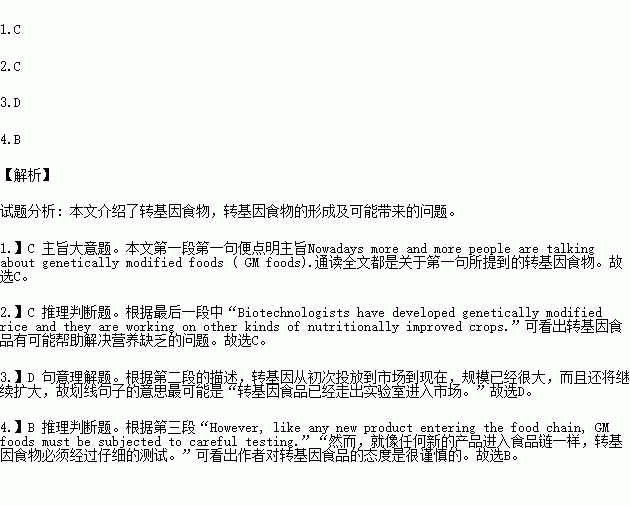题目内容
Nowadays more and more people are talking about genetically modified foods ( GM foods). GM foods develop from genetically modified organisms (有机体), which have had specific changes introduced into their DNA by genetic engineering techniques. These techniques are much more precise where an organism is exposed to chemicals to create a non?specific but stable change. For many people, the high?tech production raises all kinds of environmental, ethical, health and safety problems. Particularly in countries with long farming traditions, the idea seems against nature.
In fact, GM foods are already very much a part of our lives. They were first put on the market in 1996. A third of the corn and more than half the cotton grown in the U. S. last year was the product of biotechnology, according to the Department of Agriculture. More than 65 million acres of genetically modified crops will be planted in the US this year. The genetic genie is out of the bottle.
However, like any new product entering the food chain, GM foods must be subjected to careful testing. In wealthy countries, the debate about biotech is not so fierce by the fact that they have a large number of foods to choose from, and a supply that goes beyond the needs. In developing countries desperate to feed fast?growing and underfed populations, the matter is simpler and much more urgent: do the benefits of biotech outweigh the risks?
The statistics on population growth and hunger are disturbing. Last year the world's population reached 6 billion. The UN states that nearly 800 million people around the world are unhealthy. About 400 million women of childbearing age don' t have enough iron, which means their babies are exposed to various birth defeats.As many as 100 million children suffer from vitamin A deficiency, a leading cause of blindness.
How can biotech help? Genetic engineering is widely used to produce plants and animals with better nutritional values. Biotechnologists have developed genetically modified rice and they are working on other kinds of nutritionally improved crops. Biotech can also improve farming productivity in places where food shortages are caused by crop damage attributable to drought, poor soil and crop viruses.
1.The passage mainly talks about________.
A. the world's food problem
B. the development in biotech
C. the genetically modified foods
D. the way to solve food shortages
2.According to the passage, GM foods________.
A. will replace naturally grown foods
B. are far better than naturally grown foods
C. may help to solve the problem of poor nutrition
D. can cause serious trouble in developing countries
3.The underlined sentence “The genetic genie is out of the bottle.” in Paragraph 2 probably means that________.
A. GM foods are available everywhere
B. the technology in producing GM foods is advanced
C. genetic technology may have uncontrollable powers
D. genetic technology has come out of laboratories into markets
4.What's the writer's attitude towards GM foods?
A. Enthusiastic. B. Cautious.
C. Disapproving. D. Unbelievable.
 智能训练练测考系列答案
智能训练练测考系列答案
